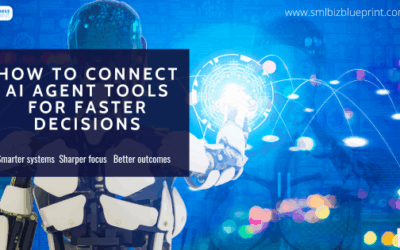In today’s hyper-competitive digital landscape, getting found online is half the battle—and that’s where AI-powered SEO tools come in.
Staying ahead of ever-changing search engine algorithms can feel like a full-time job for small businesses.
Fortunately, AI tools for SEO are transforming how businesses optimise content, conduct keyword research, improve on-page performance, and boost visibility.
This guide reviews seven of the best AI tools for SEO optimisation, each selected for its practical features, real-world applications, and ability to simplify complex tasks.
Whether you’re looking to automate keyword analysis, generate content briefs, or get real-time SEO suggestions while you write, these tools can help you work smarter, not harder.
We’ll cover:
- What each tool does best
- Key features and benefits
- Pros and cons
- Ideal use cases for small businesses
- How to choose the right tool for your SEO goals
By the end, you’ll clearly understand how AI can supercharge your SEO efforts and which tools are worth adding to your marketing stack.
#1 Surfer SEO – Real-Time On-Page Optimization with AI
Overview
Surfer SEO is an AI-powered SEO tool designed to help you create content that ranks—based on real-time data, not guesswork. It analyses the top-performing pages for your target keyword and gives you a data-backed content outline, keyword suggestions, and SEO scoring—all in a clean, intuitive interface.
It’s especially useful for content creators, marketers, and agencies aiming to boost organic traffic without relying on technical SEO knowledge.
Key Features
Content Editor: Real-time optimisation suggestions while writing
Keyword Surfer (Chrome extension): Instantly displays search volume and keyword ideas in Google results
SERP Analyzer: Deep-dive analysis of the top 50+ ranking pages
Content Audit Tool: Helps refresh and optimise existing blog posts
AI-Generated Outlines: Automatic generation of SEO-optimized content structures
Pros
Clean, user-friendly interface
Real-time feedback speeds up content creation
Great for writers and SEO professionals alike
Supports multi-language SEO
Easy to train a team on and integrate into content workflows
Cons
Limited technical SEO functionality
AI-generated content sometimes requires heavy editing
Can be pricey for freelancers or very small businesses
Ideal Use Cases
Creating new blog posts or landing pages optimised for specific keywords
Updating underperforming content to improve SEO score
Writers and content teams who want actionable SEO direction as they work
Agencies managing SEO for multiple clients across industries
#2 Clearscope – Precision SEO Content Optimization for High-Performing Pages
Overview
Clearscope is an AI-driven SEO content optimisation platform that helps you write with clarity and rank with confidence. Built with a laser focus on semantic SEO, Clearscope uses natural language processing (NLP) to analyse top-performing content and suggest the most relevant terms, topics, and readability scores.
It’s a go-to tool for businesses and marketers producing in-depth, authoritative content.
Key Features
Keyword & Topic Recommendations: AI-powered suggestions based on top-ranking pages
Content Grading: Assigns a content score (A+ to F) based on keyword relevance and completeness
Google Docs & WordPress Integration: Optimize content directly within your workflow
Readability and Word Count Targets: Tailored to competitor benchmarks
Multi-language Support: Create optimised content in several languages
Pros
Intuitive and easy-to-use interface
Excellent for long-form, in-depth content
Delivers high relevance with its NLP-based keyword analysis
Provides actionable suggestions without overloading users
Widely used by content agencies and marketing teams
Cons
Higher price point compared to entry-level tools
Less emphasis on technical SEO or backlink data
Doesn’t include a full content brief generator (like some competitors)
Ideal Use Cases
Producing pillar content, whitepapers, or long-form blog articles
Optimising product or service pages for better keyword coverage
Marketing teams aiming to improve existing content for higher relevance
Agencies focused on delivering high-performance SEO content at scale
#3 MarketMuse – AI-Powered Content Strategy and SEO Planning
Overview
MarketMuse is more than a content optimisation tool—it’s an AI-driven content strategy platform designed to help you plan, create, and optimise content that ranks and converts.
It uses machine learning to identify content gaps, assess topic authority, and generate detailed briefs, making it ideal for businesses that take a strategic, data-backed approach to SEO.
Key Features
Content Inventory & Audit: Analyze your existing content for gaps and opportunities
AI-Generated Content Briefs: Includes subheadings, questions to answer, and relevant internal/external links
Topic Modeling: Understand how deep your content coverage is across related topics
SERP X-Ray: See how top-ranking content is structured
Content Score & Difficulty Metrics: Determine how hard it is to rank and how well your content is performing
Pros
Powerful for content planning and SEO strategy
Great for identifying long-tail keyword clusters
Excellent for building topical authority and content depth
Content briefs save time in the research and planning phase
Strong internal linking suggestions
Cons
Steeper learning curve for beginners
Higher cost compared to simpler tools
Not ideal for teams only looking for basic keyword optimisation
Ideal Use Cases
Enterprises or growing content teams planning content at scale
SEO strategists aiming to dominate niche topic clusters
Brands focused on building authority through expert-level content
Content audits and competitive gap analysis for long-term SEO gains
#4 Frase.io – AI Content Creation and SEO Optimization in One Platform
Overview
Frase.io is an all-in-one AI content creation and optimisation tool that simplifies research and writing. Its intuitive dashboard helps you research topics, create SEO-focused outlines, write AI-assisted drafts, and optimise content—all in one place.
It’s particularly popular among lean marketing teams and freelancers who need to produce quality content quickly without compromising SEO.
Key Features
Content Brief Generator: Creates outlines based on top-ranking SERP results
AI Writer: Generate content, intros, FAQs, or full paragraphs using AI
SEO Optimization Panel: Offers keyword suggestions and content scoring
Answer Engine: Build an internal knowledge base or chatbot-style assistant from your content
Custom Templates & Workflows: Automate recurring content creation tasks
Pros
Combines research, writing, and optimisation into a single workflow
Fast and responsive AI writing assistant
Affordable pricing tiers for solo users and small teams
Constantly updated with new features and UX improvements
Built-in tools to create FAQ schema and optimise for featured snippets
Cons
AI-generated content often needs stylistic editing for brand voice
Doesn’t offer deep technical SEO tools or backlink tracking
Brief generation can sometimes pull in outdated results without manual tweaks
Ideal Use Cases
Freelancers and small teams looking to create SEO-optimized content quickly
Agencies that want a scalable brief and writing system for multiple clients
Content marketers producing blog posts, FAQs, or landing pages
Businesses focused on SERP features like People Also Ask or featured snippets
#5 Outranking.io – Data-Driven SEO Writing with Workflow Automation
Overview
Outranking.io is a robust AI-powered SEO tool built for teams that want to scale their content production using a structured, data-driven process. It blends AI content creation with detailed SERP analysis, fact verification, and workflow automation—making it ideal for businesses focused on consistency, accuracy, and SEO performance at scale.
Key Features
AI Writing Assistant: Drafts content with keyword relevance and factual accuracy in mind
Automated Content Briefs: Pulls real-time SERP data and competitor outlines
Content Optimization Scoring: Grades drafts against top-performing competitors
Workflow Templates: Create step-by-step SOPs for writing, editing, and publishing
Fact-Check Module: Verifies AI-generated statements to reduce misinformation
Pros
Strong SERP-based brief creation ensures content relevance
Built-in SOPs and workflows streamline large team operations
Integrates with Google Docs for seamless collaboration
Offers rich optimisation data without needing third-party SEO tools
Ideal for agencies or internal teams producing at scale
Cons
UI can feel complex for beginners
Content tone may require editing to suit brand voice
Pricing plans are better suited to mid-sized or growing teams
Ideal Use Cases
Agencies and large teams producing SEO content in high-volume
Content managers building standard operating procedures for writers
Teams prioritising fact-based content in regulated industries (finance, healthcare)
Businesses looking to automate their SEO writing workflow from research to publishing
#6 NeuronWriter – NLP-Powered SEO Writing for Smarter Content Creation
Overview
NeuronWriter is an affordable and efficient AI SEO tool that uses natural language processing (NLP) to help users create content aligned with search intent. It’s particularly strong in semantic analysis and keyword mapping, giving content creators a clear roadmap for writing optimised articles that rank well and read naturally.
Key Features
Content Editor with NLP Guidance: Real-time keyword suggestions and optimisation scoring
SERP Analysis: Deep-dive into competitor content for structure and keyword gaps
Content Planning Tool: Organize target keywords, search intent, and outline ideas
Multi-Language Support: Ideal for international SEO strategies
Google NLP Entity Integration: Match your content with Google’s understanding of topics
Pros
Affordable pricing makes it accessible to freelancers and small teams
Excellent for optimising long-form blog content
Strong semantic keyword suggestions based on Google NLP entities
Great UI/UX with a short learning curve
Helps writers avoid keyword stuffing while improving depth
Cons
No AI writer for full content generation (requires pairing with a writing tool)
Lacks built-in plagiarism checker or fact-checking features
Limited integrations compared to more expensive platforms
Ideal Use Cases
Content marketers writing detailed blog posts or guides
Freelancers and solopreneurs looking for a budget-friendly SEO tool
Small businesses optimising existing content with semantic keyword data
Non-English content creators needing multi-language SEO support
#7 Semrush SEO Writing Assistant – Real-Time Guidance for SEO-Optimized Content
Overview
Semrush SEO Writing Assistant (SWA) is an AI-enhanced extension of the Semrush platform, offering real-time content optimisation recommendations as you write. It analyses your content against top-ranking competitors and provides insights on readability, keyword usage, tone of voice, originality, and SEO structure—making it ideal for marketers already using the Semrush ecosystem.
Key Features
SEO Recommendations: Real-time suggestions based on target keywords and competitors
Readability Score: Ensures your content matches audience reading levels
Tone of Voice Analysis: Helps maintain consistent brand voice
Plagiarism Checker: Detects duplicate content before publishing
Google Docs and WordPress Plugins: Write and optimise in your preferred environment
Pros
Seamlessly integrates with existing Semrush workflows
Great for ensuring content consistency across teams
Plagiarism and tone tools add editorial polish
Provides optimisation without needing to leave your writing platform
Ideal for content marketers and in-house teams
Cons
Requires Semrush subscription (adds to cost if you’re not already a user)
Less robust than full-feature tools like MarketMuse for strategic planning
Better suited for on-page content tuning than long-term SEO strategy
Ideal Use Cases
Marketing teams already using Semrush for keyword research and audits
Content creators optimizing drafts in real-time across multiple platforms
Businesses needing tone, originality, and SEO consistency at scale
Editors and content leads refining blog posts and landing page copy
Conclusion
The future of SEO is already here—and it’s powered by AI.
From real-time content optimisation with Surfer SEO to comprehensive strategy tools like MarketMuse and streamlined content creation with Frase.io or NeuronWriter, these platforms eliminate guesswork and help you produce content that ranks, converts, and scales.
Here’s a quick recap of what each tool brings to the table:
- Surfer SEO: Best for real-time, on-page content optimisation
- Clearscope: Ideal for semantic depth and readability
- MarketMuse: Comprehensive content strategy and topic planning
- Frase.io: Speedy content research and AI-assisted writing
- Outranking.io: Workflow automation and data-driven briefs
- NeuronWriter: Budget-friendly NLP content optimisation
- Semrush SEO Writing Assistant: Seamless integration with content workflows and editorial polish
Whether you’re a solo entrepreneur, content marketer, or agency, there’s an AI SEO tool here that can streamline your workflow, improve search rankings, and ultimately drive better results—faster.
FAQs
Q1: What are AI SEO tools, and how do they work?
A1: AI SEO tools use machine learning and natural language processing to analyse search engine data, competitor content, and keyword trends. They offer actionable recommendations for optimising content structure, keyword usage, readability, and overall SEO performance—often in real-time.
Q2: Which is the best AI tool for SEO content creation?
A2: If you’re focused on writing blog posts quickly with SEO in mind, Frase.io or Surfer SEO are excellent choices. For deeper strategy and topic authority, MarketMuse stands out. The best choice depends on whether your priority is speed, strategy, or scale.
Q3: Can small businesses afford to use AI-driven SEO tools?
A3: Yes. Tools like NeuronWriter and Frase.io offer budget-friendly plans suitable for freelancers and small teams. These tools provide strong optimisation features without the higher price tags of enterprise-level platforms.
Q4: Do AI SEO tools replace the need for human writers?
A4: No. AI tools assist with structure, keyword usage, and optimisation, but human writers are still essential for creativity, tone, brand messaging, and connecting with audiences on an emotional level. The best results come from combining AI insights with human expertise.
Q5: How do I choose the right AI SEO tool for my business?
A5: Consider your specific goals:
For real-time content optimisation, go with Surfer or Clearscope.
For strategic planning, choose MarketMuse.
For quick content production, Frase or Outranking.io.
For budget-conscious teams, NeuronWriter is a smart pick.
Also consider ease of use, integrations, and the size of your content team.
Q6: How often should I use AI tools to update or audit existing content?
A6: Aim to audit and refresh existing content every 3–6 months, especially if rankings are dropping or keyword trends have shifted. Tools like Surfer, Clearscope, and Outranking.io are ideal for this purpose.
Q7: Will using AI-generated content hurt my rankings on Google?
A7: Not if used correctly. Google’s priority is useful, high-quality content. If AI-generated content is optimised, fact-checked, edited for clarity and tone, and provides real value to users, it can rank very well. Avoid generic or keyword-stuffed AI text that lacks depth.
Other Articles
How to Build a Data Strategy in 2025 & Future-Proof Growth
How to Use AI and Automation to Scale Your Small Business Fast




